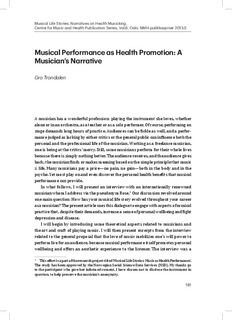| dc.description.abstract | I will present an interview with an internationally renowned musician whom I address via the pseudonym Rose. Our discussion revolved around one main question: How has your musical life story evolved throughout your career as a musician? The present article uses this dialogue to engage with aspects of musical practice that, despite their demands, increase a sense of personal wellbeing and fight depression and disease. I will begin by introducing some theoretical aspects related to musicians and the art and craft of playing music. I will then present excerpts from the interview related to the general proposal that the love of music mobilizes one’s will power to perform live for an audience, because musical performance itself promotes personal wellbeing and offers an aesthetic experience to the listener The basic assumption in this text is that the relating experience is the driving force of human development and growth. Using music as a relating experience (to oneself and to others) is also understood here as a way of ‘being-in-the-world’ (Trondalen, 2008). In other words, music serves as a means of performing personal identity. As we have seen, a humanistic and resource-oriented perspective (as presented here) can still take the person’s illness (the biomedical perspective) into consideration but in a specifically dialogical way that focuses positive creative resources on the process of coping with a variety of limitations. Such a humanistic-existential perspective can in turn be interpreted as self-caring or self-actualisation. From a philosophical point of view, the human being can be understood as homo communicans and defined by her inherent ability to share experiences and actions. Such an exchange allows us to recognise one another on a fundamental level, and to partake in others’ lives. The human being is self reflexive—the only species, in fact, that appears to reflect upon its own peculiar nature. Connections based upon the deepest experiences and existential longings in life comprise a universal human phenomenon, and musicians, whose lives are so closely linked to existential dimension, are no exception to this rule. Existential longing is linked to something life giving, vitalising and unifying—something that transcends the limited/controlled self and touches the human being’s deepest value as a human creation (Engedal, 2003). Sharing dreams and values, both during the interview, and in the reflective process afterwards, reminds me that all human being are always more than—semper major— any given personal narrative or observation. What we perform in life, whether musically, biologically, socially or spiritually, will never fully disclose the depths of our existence | nb_NO |
